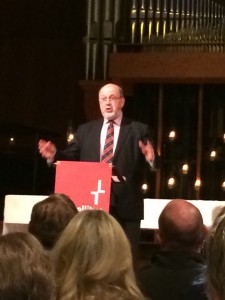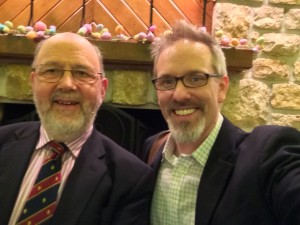NT Visits KC
Yesterday was (for me) N.T. Wright Day, the long awaited day when I had the opportunity to both meet and listen to N.T. (Tom) Wright lecture live in person. In looking forward to this event I felt like a 14 year-old girl preparing for our One Direction concert. In meeting Tom, I felt like a pastor from the 20th century meeting Karl Barth. I think Tom Wright is important. In a hundred years when the history of theology is written about the early 21st century, I think Tom Wright will stand head a shoulders above the rest as the most influential theologian of our generation.
I thoroughly enjoyed both the morning and evening lecture. Ellis Brust and the St. Mellitus Theological Centre did a wonderful job hosting the event. Hats off to them and the staff and volunteers of Christ Church Anglican for their hospitality and work in putting together the logistics for this one-day event in such a short time. They announced the event a couple of months ago and it sold out in three weeks.
While thoughts are still fresh in my mind, I want to share some of the notes I took from both lectures. As all Tom Wright devotees know, he talks fast. He spits forth truth with rapid-fire accuracy. There is no way I can transcribe the entirety of his lectures, but I can share a few notes.
The evening lecture was a hurried overview of his massive work on Paul’s theology, Paul and The Faithfulness of God. I am finishing the book during Lent. I should be done by Easter Sunday. My goal is to create an extensive outline of the book over the summer and then teach a 10-12 week class on the book in the fall. Tom has interpreted Paul for the church and I want to interpret Tom for you. So if N.T. Wright has left you wanting more, hold on. A class is coming soon to Word of Life Church.
Here are some of my takeaways from N.T. Wright Day at the St. Mellitus Theological Centre in KC.
Morning Lecture
The Gospel is good news. We cannot assume people are asking the questions that make the good news really good news. People in the Western world today are not walking around asking, “How can I know I am saved and am going to heaven when I die.”
The gospel is a new way of looking at the world.
The resurrection is like a strange, but beautiful gift that causes us to remodel our house to be shaped by it.
The gospel is scandalous and foolishness, but to those of us who believe it is the power of God.
We need to preach the gospel more than prove it. We do not need to prove it according to the values of Western rational enlightenment.
The word “god” is a question mark in our culture. Often when people say “I don’t believe in god,” we should say “I do not believe in that kind of god either, I believe in the God revealed in Jesus Christ.”
God is not distant. (Deism/epicureanism are the dominate views of god in our world.)
There are many tombs to the unknown god in our world.
Jesus reveals God. Jesus exegetes God for us.
Many people in our culture have a passion for justice. We can capitalize on this passion as justice is connected with the Gospel.
Liberal democracy has NOT brought us utopia.
Western democracy does not have a narrative to do justice. Progress, yes. Justice, no. God is about bringing a new world of justice and peace. (Isaiah 11)
We need not a happy triumphalism over the other ways of being human, but a travail in prayer with those who suffer. (This is a picture of doing justice.)
The 18th century dismissed political theology. Religion was to be private, spiritual, and about heaven. The thought was “let us enlightened, reasonable human beings figure out how to run the world.”
The church is to speak to power. (The cross was the voice of justice to the powers that be.)
We get our atonement theology in the redefinition of power.
We have idolized our modern culture. We have become smug and self-serving.
Christianity is rejected by modernism and postmodernism for different reasons. They both deny the Christian narrative. We say history turned a corner not in the 18th century age of enlightenment, but at the resurrection of Jesus Christ. Postmodernism rejects all meta-narratives. Postmodernism never sees a turn in human history.
The big story of Christianity is not a power story but a love story.
Thoughts from the Q&A after the morning session….
Paul layers the Jewish narrative for us in Romans that we look through in order to see his point.
Romans 7 is a retelling of Israel’s story/struggle.
In a strange way, Israel was to be the Isaiah 53 people suffering in order to bear God’s image.
Evening Lecture
Everywhere St. Paul went there was a riot. Everywhere I go they serve tea.
Paul pitched his tent near the fault lines between Jewish culture, Greek philosophy, ancient religion, and Roman politics.
God’s new creation has launched through the death, burial, and resurrection of Jesus.
In starting communities loyal to Jesus, Paul started a new discipline, what we call Christian theology. This is the central thesis of Paul and the Faithfulness of God.
Diverse people come together to be a family in Christ, holy and united, and they need to be sustained by something new…new symbols.
Paul believes unity happens as these communities practiced what we call “theology.”
Jews did not do theology, not the way Christians did/do.
Be ignorant of evil, but be mature in your thinking.
After Paul says everything he has to say in Romans 1-11 about the Gospel, Jesus’ death, justification, the unity between Jews and Gentiles, etc. he then says in Romans 12 “be transformed by the renewing of your mind.”
People take doctrinal questions to Paul (and he does in fact have many answers to these questions), but Paul does not simply want to give us a list of answers he wants us to teach people to think Christianly.
Teach a person to think Christianly and you will build up the church for generations to come.
Every generation needs to think fresh and new, to face new challenges in the light of Christ.
Christianity is a new sort of knowing. It is a new epistemology. 2 Corinthians 5 calls this “new creation.”
Every person in Christ becomes a little model of new creation.
God is not an object in our universe; we are objects in his universe. He wants us to become thinking objects in his universe, thinking according to a new kind of knowledge.
What does it mean to be a human being? We reflect God’s love and stewardship to the world, and then we return back the praises of creation.
God wants people not puppets.
What is launched in resurrection is transformation.
Paul’s writing is rooted in Scripture, Paul may quote a line from Hebrew Scripture, but he has the entire context in mind. He was not proof-texting the Old Testament to prove things like justification by faith. Rather, in Romans, he was thinking about the entire Jewish narrative.
The whole world is to be God’s holy land.
Genesis 15: Abraham – This is God’s plan to save the world.
Biblical theology is narrative theology. How does the narrative work? We are invited to participate in it.
Daniel 9: Daniel’s prayer in exile
Combine Daniel’s prayer with the expectation of covenant renewal (Deut. 30) and the promise of a new covenant (Jer. 31) and we see the Jewish expectation in Paul’s day. They were expecting liberation and new way of living as the people of God.
First century Jews were not asking, “How can I know that I will go to heaven and not hell?” They were asking questions about the renewal of the covenant.
What Israel thought would happen at the end of the age, happened in the middle to one son of Abraham.
Exodus is retold by Paul, rethought through Jesus and the Spirit.
Ezekiel 1 is a vision of God’s throne; God taking off (abandoning) the temple.
Ezekiel 43 speaks of the return of God to the temple.
Isaiah 40 speaks of the time when the glory will come back.
First century Jews looked for the return of Yahweh to Zion and none of Israel’s prophets said it has happened yet. It was still a future event. John announces “IT HAS HAPPENED!” John 1. The Word became flesh and tabernacle among us.
Paul says in him dwelt (this is temple language) the fullness of the God bodily.
In order to understand Paul, be so soaked in Scripture (Old Testament) that you know where Jesus is going.
1 Corinthians 8:6: Shema language: The LORD is one. The answer to what to do with eating meat is found in doing theology. God is one. One Lord Jesus.
Philippians 2: Jewish monotheism and layers of theology
“Work out your own salvation.” This is not a call to pull yourself up by your bootstraps…rubbish!
Paul’s task: The new vision of God seen in Jesus and the Spirit.
Galatians and Romans: A new story of Exodus
Romans 8: “led by the Spirit” is language from the exodus (pillar of cloud by day / pillar of fire by night)
Theology is the central task of the church.
Election: Who are the people of God?
In Paul, election is renewed. God has ONE family. (Galatians 3) A new people who inherit the promises given to Abraham.
Justification: not a mechanism for going to heaven
God’s purpose is to put the world right. This action requires God putting people right.
Start with God’s people redefined through Jesus and that helps sort out theological problems related to justification.
Every Christian must learn how to think through:
MONOTHEISM
ELECTION
ESCHATOLOGY
Eschatology in Paul has little to do with the American fascination with the rapture. A caller to a radio show asked: “How does Mr. Wright think he will get to heaven if he is not raptured?”
Phil 3: Our citizenship is in heaven, but we are to colonize the world with the culture of heaven.
Paul redefines monotheism, election, and eschatology around Jesus and the Spirit. This is all political dynamite.
Power gets redefined around the cross.
Acts 17: Paul in Athens. He spoke longer than 2 minutes. He probably spoke for 2 hours or more. He navigates between religion and philosophy in order to preach the gospel.
Theology is joined up for Paul in prayer.
Romans 9-11 opens with a lament and closes with praise, just like many of the Psalms.
Paul includes his own prayers in his writing to the Ephesians.
Our theology does not lead us to know it all, but it leads us to worship.

